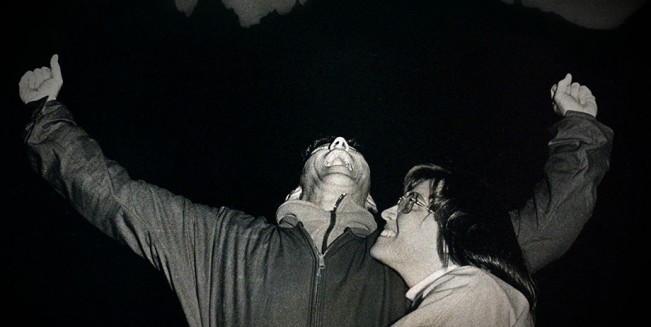By Jake Howell jake.howell@utoronto.ca
The Torontonian Reviews Sunshine Superman
 There’s a range of buzzed-about nonfiction films at TIFF this year, but after asking the documentary programmers about their personal favorites in the selection, I was directed towards Sunshine Superman, Marah Strauch’s documentary debut that follows the life and times of gregarious BASE jumper Carl Boenish (“rhymes with Danish”). Before his untimely death in 1984, Boenish was a founding father of jumping from things he probably shouldn’t be—including Troll Wall in Norway, the craggy mountain that would eventually kill him—yet this tragedy only bolsters the film as an engaging love-letter to living life to the extreme.
There’s a range of buzzed-about nonfiction films at TIFF this year, but after asking the documentary programmers about their personal favorites in the selection, I was directed towards Sunshine Superman, Marah Strauch’s documentary debut that follows the life and times of gregarious BASE jumper Carl Boenish (“rhymes with Danish”). Before his untimely death in 1984, Boenish was a founding father of jumping from things he probably shouldn’t be—including Troll Wall in Norway, the craggy mountain that would eventually kill him—yet this tragedy only bolsters the film as an engaging love-letter to living life to the extreme.
BASE jumping—or building, antenna, span and Earth jumping—wasn’t a thing before Carl Boenish appeared, but because of him it’s now the liberating (read: insane) act of parachute-controlled freefall that was never really regulated or understood by the authorities as anything other than a liability. That includes park rangers who keep watch on El Capitan, the massive cliff in Yosemite Valley that Boenish and his fellow freefallers in the 1970s routinely scaled and flung themselves from, despite the fact that it was illegal. Detaining them wasn’t exactly going to stop them (let’s face it: if they’re jumping off cliffs, they’re not exactly too worried about a slap on the wrist), so Boenish organized a charge to make compromises with government officials with a cheerful attitude and his goofy, never-ending smile. In short, he caught more flies with honey, and it made him a natural figurehead for the activity.
Because Boenish was an avid cinematographer himself, Strauch has a wealth of spools from Boenish’s personal archive, which often includes the freefalling perspective of Boenish’s helmet-mounted camera. Much of it is exhilarating: taking to the skies and filming from great heights alleviates any potential talking head syndromes other documentaries suffer from, and the title of the film feels wholly appropriate. There are also flashes of Gimme Shelter here; Strauch includes footage of Boenish reviewing his own film, commenting on and laughing about what he’s documented, and it adds to the film’s vibrancy and joie de vivre.
There are contemporary interviews from the people involved with Boenish, including his sunny wife Jean, who alongside Carl quickly became a spokesperson for BASE jumping as a way to express the capabilities of mankind’s curiosity and freedom. That theme—the idea that life is something to make the most of and death isn’t something to be afraid of—is touched upon to compelling effect here, as the film ultimately culminates in the 1984 accident that claimed Carl Boenish’s life. Strauch catches up with Jean decades later to reflect on her late husband, and her sentiments aren’t that she regrets Carl jumped from something he knew was a poor idea. Rather, Jean extolls the virtues of Carl’s ambitions, and closes the film with a speech that reiterates the saying that no one leaves this mortal coil alive.














This film is a tribute to the patience and resolve of Marah Strauch, as well as a tribute to my BASE brother, Carl Boenish. One thing they both have in common is a passion for photo-documentation.
I never would have believed that it was possible, in this age of GoPro amateur photography and wingsuit flying (spawned by Boenish’s direct efforts), to turn thirty+year old subject matter into a story that has modern day appeal – to both jumpers and non-participants.
Phil Mayfield – BASE #2, Night BASE #1